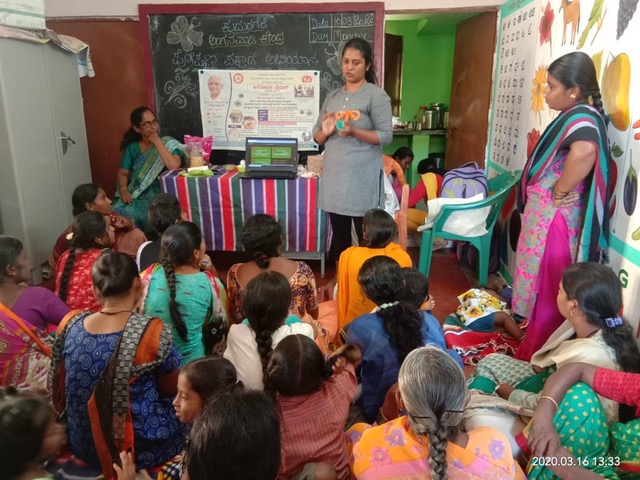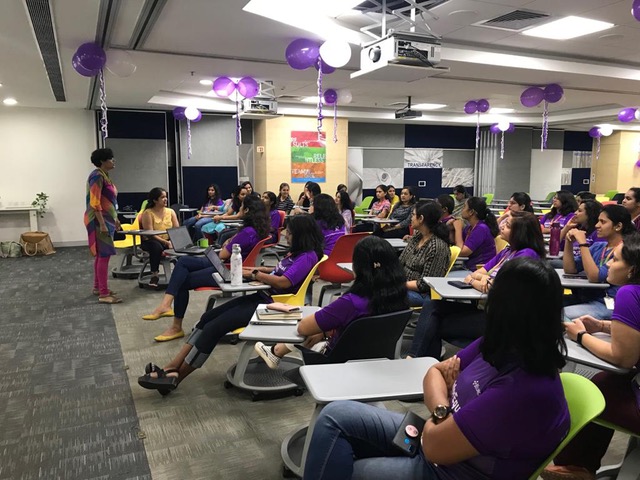“To achieve zero waste and eliminate the need for transportation to pick the garbage for further processing,” Smita Kulkarni, a techie decided to ditch her comforting corporate job and became a social entrepreneur. Environmental activist, Smita Kulkarni into a social entrepreneur has co-founded Stonesoup with her friend Malini Parmar in the year 2015. It is a social enterprise based out of Bengaluru that offers sustainable and eco-friendly alternatives.
She is one of the founding members of Bangalore Eco Team(BeT) that is a congregation of city-wide volunteers working on Solid Waste Management initiatives. She has been instrumental in getting a plastic ban implemented in many areas across Bengaluru and beyond. She is particularly passionate about spreading the word on sustainable menstruation and has spoken about it on several platforms like CII, Raahat, BigFM radio, TEDx, government and private organizations, educational institutes and communities. In a conversation with the TEV, she shares her journey and her plans.
Q) How did you get the idea to start the organisation ‘Stonesoup‘ and what has been the core vision of the organisation?
Smita: My friend Malini Parmar who is also one of the founders of Stonesoup and I have been working with Bruhat Bengaluru Mahanagara Palike (BBMP) to create awareness regarding segregation. However while doing so, we have realised that the amount of waste generated in the city is humungous, which is around 6000 tonnes per day. This huge amount of waste requires landfill to dump which causes various other implication on the environment and also getting land is also not very feasible. We always thought that how can the burden can be reduced by reducing the amount of waste.
To solve this issue, it was important to provide solutions to people that are convenient to use. That how Stonesoup came into existence, we introduced compost kits for the household and at the community level so that the problem of wet waste (kitchen waste) can be solved. A total of 60 per cent of the total waste is wet waste and if compositing gets started at a household level it is will reduce a lot of burden of waste. For around, 30 per cent in the dry waste which includes plastic bags and others. We also introduced a series of alternatives such as cloth bags which can easily be re-use and it also helps in reducing the waste. Almost 5 to 10 per cent of the total waste generated is sanitary waste and to address that we introduced menstrual cups and clothes pad as an alternative which is eco-friendly and can be used for many years. With all our solution, we aim to provide zero waste solutions to the community and also help in reducing the workload on the administration.
Q) What compositing methodology is used in various compositing products provided by Stonesoup and how it is helping the community?
Smita: We use aerobic composting which is the easiest and fastest decomposition of organic matter using microorganisms that require oxygen. We provide compositing solution for both households as well as the community level. For household level, we provide a plastic container with a capacity of 20 litres while at community level MS container is provided for compositing. At the household level, one can immediately compost the kitchen waste at the time it is created without any stinking. The kitchen waste/wet waste can be layered with the compost maker powder consist of microbes in the bin and took around three to four week for the compositing. Therefore, we had started one- week challenge and mentioned that even if someone has one such bin they can at least reduce the burden on Corporation for one week as they can compost in their own home. However, they can always have three to four bins depending upon the requirement and can reduce the dependency on the corporation for their kitchen waste.
We hope that with this compositing solution we will not only reduce the burden of solid waste management but also eliminate the need of garbage picking as transportation of garbage required a lot of amounts which is nothing but the public money. Later, this compost can be simply used as a manure in the garden. We always wanted to decentralise waste management so that processing can happen locally. Usually, the garbage collected is taken to the ward centre. which is followed by Central and city centre. This process is so lengthy that it start stinking, instead of compositing this waste gets rotten causing more problems and health hazards. With these solutions, the waste can be compost at the source without any stinking and the burden will be reduced on the administration.

Q) What have been challenges faced through the journey of this organisation?
Smita: The journey so far was full of challenges, one of it was a budget constraint. Therefore, with our limited budget, we joined various volunteer group to create awareness among the masses. We have been part of many movements started by people to connect with the community. We have also been instrumental in the plastic ban which was implemented in the year 2016.
Another challenge was convincing people for using menstrual cups and therefore with the help of gynaecologists, we created awareness about the same. Initially, when we use to conduct the session of 100 people only 3 to 4 of them have heard about the menstrual cup and after the session only 1 or 2 did buy. However, with more such session, awareness has increased and now 95 of them know about the menstrual cup and many choose to use it also.
Whether waste management (compost pits) or menstrual cup with the help of various campaigns the awareness has been built organically and the difference can be seen as more and more people are inclined towards adopting these measures of sustainability.Even in the lockdown, we continued to conduct session online and got a really good response.
Q) Why did you ditch your corporate career to start a social organisation?
Smita: As an IT professional, there is money and a great professional career but there are very few chances of making an impact in society. Even if you do so, it still very less. However, while working for the environment and providing solutions to the people for sustainable living is extremely satisfying and the impact created due to this is tenfold as compared to the job. Therefore, I decided to switch from an IT career to provide convenient sustainability solutions.

Q) What are the various environmental implication of not having proper solid waste management and how did you convey this message to the masses?
Smita: There are serious implication if the problem of solid waste is not solved or dealt with seriousness. Firstly, a lot of it goes to landfills and through leeching it can also result in groundwater contamination and other environmental hazards are animals consuming it or garbage entering into water bodies causing serious hazards. Therefore, it is important to reduce our waste footprints and adopt eco-friendly measures so that these issues can be resolved. However, we chose to highlight, the ease of using these products rather than only telling about the implication if the waste is not treated properly. Ease of use and convenience is often well-received and accepted in a better way. Therefore in our session, we convey not only environmental benefits but also the related health, monetary and convenience benefits as well that can be achieved by adopting these eco-friendly measures.
Even in lockdown, we have conducted the session online and we realised that people were really happy with this eco-friendly solutions. It could have been possible because of the inconvenience faced during the lockdown in the collection of waste and they understand the importance of having such a solution at their disposal.
Q) What are your plans for Stonesoup?
Smita: We have already provided people with sustainable choices for waste management and now in future, we will focus more on creating livelihood for people. We are working with Self-help group of tier-2 cities for clothes bags, clothes pad and now cloth masks as well. We will be collaborating with FICCI FLO and Rotary to create more livelihood for people who have lost their jobs during the pandemic which was followed by lockdown. Connecting with them, we will also focus on having local centres so that transportation is also reduced which will help in reducing carbon footprints as well.
Instrumental in Plastic ban in Karnataka in the year 2016
“In January 2016, with the help of local MLA of HHSR layout, BBMP officers, we communicated to all the shop-keepers making them aware about it as they were scared if they will not offer plastic bags, the customers might not come to their shop. After convincing them, a voluntary ban on the plastic ban has started in HHSR layout. It was well-received as replicated in other 15 wards of the city with the help of local MLA and BBMP officials. After a lot of pushing, in March 2016 finally, the notification was passed for the entire state of Karnataka to ban the use of plastic in March 2016,” said Smita Kulkarni


Sanitising, cleaning, disinfecting are the new norms today.
3 times water is required now.
reThink solves every day problem by saving WATER, POWER & reducing POLLUTION.
reThink saves for you & is good for the society.